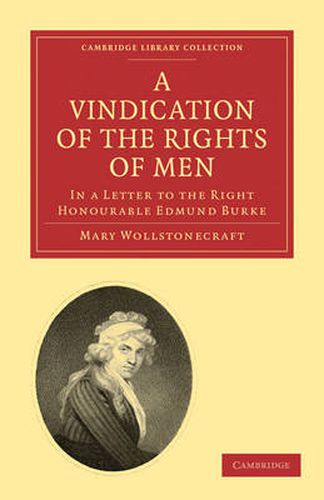Readings Newsletter
Become a Readings Member to make your shopping experience even easier.
Sign in or sign up for free!
You’re not far away from qualifying for FREE standard shipping within Australia
You’ve qualified for FREE standard shipping within Australia
The cart is loading…






Mary Wollstonecraft (1759-1797) published A Vindication of the Rights of Men anonymously in 1790. The pamphlet sold out within three weeks to great acclaim, though later editions published under her own name met with notable opprobrium. It was the first of many printed responses to Edmund Burke’s conservative attacks on the French Revolution, and it marked Wollstonecraft’s entry into the intellectual arena of the late eighteenth century. She attacked hereditary privilege and political conservatism, arguing for codified civil rights and political liberty. She also highlighted Burke’s gendered language and criticised his silence on the plight of women. Wollstonecraft has inspired reverence and revulsion alike, for both her work and her lifestyle. Her prescience and nonconformity, however, have secured her position in the canon of distinguished eighteenth-century political thinkers. For more information on this author, see http://orlando.cambridge.org/public/svPeople?person\_id=wollma
$9.00 standard shipping within Australia
FREE standard shipping within Australia for orders over $100.00
Express & International shipping calculated at checkout
Mary Wollstonecraft (1759-1797) published A Vindication of the Rights of Men anonymously in 1790. The pamphlet sold out within three weeks to great acclaim, though later editions published under her own name met with notable opprobrium. It was the first of many printed responses to Edmund Burke’s conservative attacks on the French Revolution, and it marked Wollstonecraft’s entry into the intellectual arena of the late eighteenth century. She attacked hereditary privilege and political conservatism, arguing for codified civil rights and political liberty. She also highlighted Burke’s gendered language and criticised his silence on the plight of women. Wollstonecraft has inspired reverence and revulsion alike, for both her work and her lifestyle. Her prescience and nonconformity, however, have secured her position in the canon of distinguished eighteenth-century political thinkers. For more information on this author, see http://orlando.cambridge.org/public/svPeople?person\_id=wollma